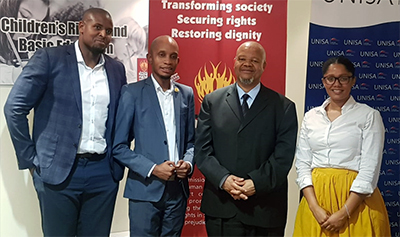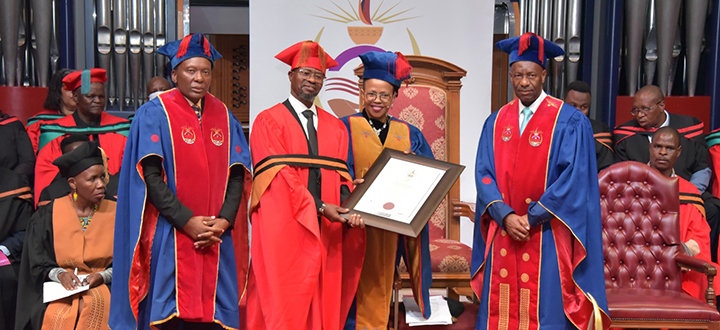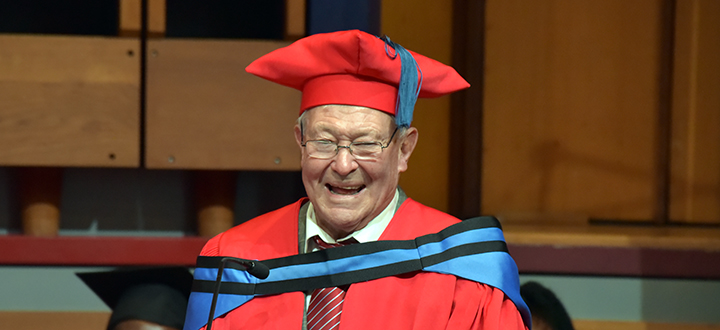News & Media
Addressing human rights challenges at Unisa
In his role as the Principal and Vice-Chancellor of Unisa, Prof Mandla Makhanya requested the South African Human Rights Commission (SAHRC) in December 2017 to conduct an investigation into allegations and counter-allegations of racism, harassment, bullying and victimisation at Unisa and advise the university on appropriate interventions to address these challenges.

Prof Bongani Majola (Chair: SAHRC), Buang Jones (Gauteng Provincial Manager: SAHRC), Prof Mandla Makhanya (Principal and VC: Unisa), and Kelly-Anne Cleophas (Legal Officer: SAHRC)
Following receipt of this request, the SAHRC held an inquiry from 20 February to 18 May 2018 to gather information and evidence of the challenges faced by the university.
On 12 November 2018, the SAHRC released the outcomes of the investigation into allegations of racial tension, unfair discrimination and harassment at Unisa.
In the said outcome, it is stated that, “The recommendations are fairly broad and in order to implement change at Unisa, the Commission and Unisa agreed to enter into a memorandum of agreement (MoA) with clear timelines that will provide the framework within which these recommendations will be implemented.”
On 5 December 2018, the VC and the SAHRC CEO, Advocate Tseliso Thipanyane, signed the MoA, which seeks to outline key activities and timelines in order to implement the broad recommendations in the SAHRC investigation outcome.
The MoA reflects the parties’ commitment to taking a co-operative approach towards addressing institutional and human rights challenges that face Unisa. The MoA further reflects the parties’ commitment to a partnership approach to the achievement of substantive transformation at Unisa and the implementation of appropriate interventions aimed at mending relations, strengthening internal dispute resolution mechanisms and building social cohesion among its employees.
Recommendations
The signed MoA records the key areas of agreement emanating from the SAHRC investigation outcome, as a package, between the parties and to outline the different responsibilities and obligations for each party.
The recommendations are:
- Accountability of management should be strengthened
- Human resource policies and establishment of a diversity and transformation fund
- Enhanced oversight role of the Employment Equity Office
- A policy on racism and racial harassment
- Review of current governance models at Unisa
- Effective complaints procedures and appointment of an advisory panel
- Resolution of disputes and dealing with protest action
- Interventions that can foster a culture of diversity and to promote social cohesion
- Establishment of a Centre for Human Rights
Arrangements
The parties agreed to establish a joint working committee by 21 January 2019, which shall comprise three members of the SAHRC and three members of Unisa to monitor the implementation of the agreement.
The parties also agreed to work closely and cooperate in the implementation of the signed agreement and endeavour to resolve disputes arising between them in relation to the agreement by amicable means.
*By Tshimangadzo Mphaphuli
Publish date: 2018-12-10 00:00:00.0

 Seven Unisans nominated for the NSTF-South32 Awards 2023/2024
Seven Unisans nominated for the NSTF-South32 Awards 2023/2024
 Unisa awards posthumous honorary doctorate to literary maven, OK Matsepe
Unisa awards posthumous honorary doctorate to literary maven, OK Matsepe
 From humble beginnings to academic leadership
From humble beginnings to academic leadership
 Community champion and agricultural entrepreneur extraordinaire honoured by Unisa
Community champion and agricultural entrepreneur extraordinaire honoured by Unisa
 Ghanaian-born Swede earns PhD in Information Sciences from Unisa
Ghanaian-born Swede earns PhD in Information Sciences from Unisa